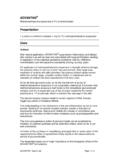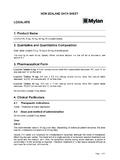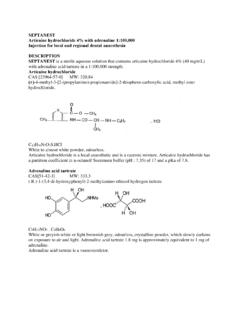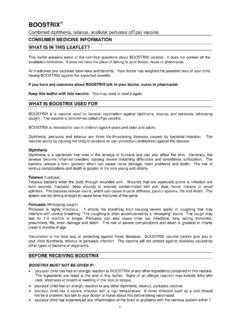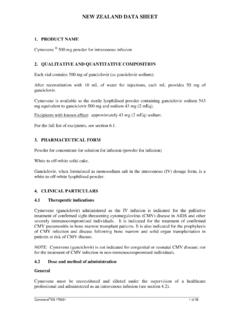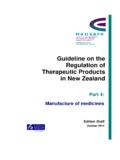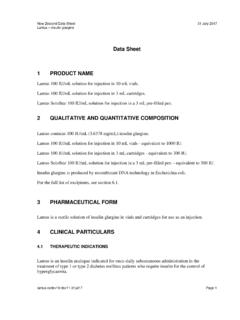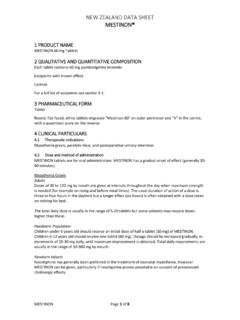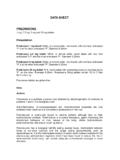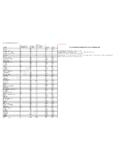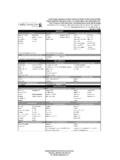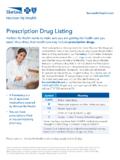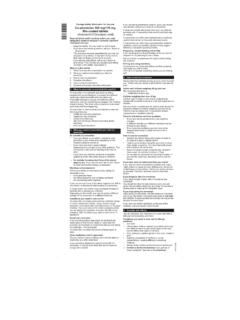Transcription of NEW ZEALAND DATA SHEET - Medsafe
1 1 NEW ZEALAND data SHEET 1. PRODUCT NAME AUGMENTIN syrup 125 mg powder for oral suspension AUGMENTIN FORTE syrup 250 mg powder for oral suspension AUGMENTIN tablets 500 mg/125 mg film coated tablet 2. QUALITATIVE AND QUANTITATIVE COMPOSITION AUGMENTIN syrup: When reconstituted, each 5 mL contains amoxicillin trihydrate equivalent to 125 mg amoxicillin and potassium clavulanate equivalent to mg clavulanic acid. AUGMENTIN FORTE syrup: When reconstituted, each 5 mL contains amoxicillin trihydrate equivalent to 250 mg amoxicillin and potassium clavulanate equivalent to mg clavulanic acid. AUGMENTIN tablets: Each film coated tablet contains amoxicillin trihydrate equivalent to 500 mg amoxicillin and potassium clavulanate equivalent to 125 mg clavulanic acid. Excipients with known effect AUGMENTIN syrup and AUGMENTIN FORTE syrup: contains mg of aspartame per mL. For the full list of excipients, see section List of excipients. 3. PHARMACEUTICAL FORM AUGMENTIN syrup: Powder for oral suspension .
2 Off-white powder. AUGMENTIN FORTE syrup: Powder for oral suspension . Off-white powder. AUGMENTIN tablets: White to off white, oval shaped, film coated tablets, approximately 20 mm x mm, engraved 'AC' with a score line on one side and plain on the other side. Therapeutic indications AUGMENTIN should be used in accordance with local official antibiotic prescribing guidelines and local susceptibility data . AUGMENTIN is indicated for the short term treatment of common bacterial infections in adults and children such as: Upper Respiratory Tract Infections (including ENT): tonsillitis, sinusitis, otitis media 2 Lower Respiratory Tract Infections: acute exacerbations of chronic bronchitis, lobar and broncho-pneumonia Genito-urinary Tract Infections: cystitis, urethritis, pyelonephritis, female genital infections Skin and Soft Tissue Infections Bone and Joint Infections: osteomyelitis Other Infections: septic abortion, puerperal sepsis, intra-abdominal sepsis, septicaemia, peritonitis, post-surgical infections Susceptibility to AUGMENTIN will vary with geography and time.
3 Local susceptibility data should be consulted where available, and microbiological sampling and susceptibility testing performed where necessary. Infections caused by amoxicillin susceptible organisms are amenable to AUGMENTIN treatment due to its amoxicillin content. Mixed infections caused by amoxicillin susceptible organism in conjunction with AUGMENTIN-susceptible beta-lactamase-producing organisms may therefore be treated by AUGMENTIN. Dose and method of administration Dose Adults and children 40 kg and over: One AUGMENTIN tablet twice daily for mild to moderate infections. For lower respiratory tract infections, complicated urinary tract infections or severe infections at other sites, one to two AUGMENTIN tablets three times daily. Children 7 - 12 years: 5 mL of AUGMENTIN FORTE syrup three times daily. In severe infections this may be increased to 10 mL of AUGMENTIN FORTE syrup three times a day. Children 2 - 6 years: 5 mL of AUGMENTIN syrup three times a day.
4 In severe infections this may be increased to 10 mL AUGMENTIN syrup three times a day. Children 9 months - 2 years: mL of AUGMENTIN syrup three times a day. Children 3 - 9 months: mL of AUGMENTIN syrup three times a day. Premature: No dosage recommendations can be made for this category. Special populations Elderly No adjustment needed, dose as for adults. If there is evidence of renal impairment, dose should be adjusted as for renally impaired adults (see below). Renal impairment Adults: Dosing adjustments are based on the maximum recommended level of amoxicillin. 3 Mild Impairment (creatinine clearance >30 mL/min) Moderate Impairment (creatinine clearance 10-30 mL/min) Severe Impairment (creatinine clearance <10 mL/min) Tablet No change in dosage 1 tablet 12 hourly 1 tablet once daily Dialysis decreases serum concentrations of AUGMENTIN. An additional dose may need to be supplemented at the end of dialysis.
5 Children: Dosing adjustments are based on the maximum recommended level of amoxicillin. Mild Impairment (creatinine clearance >30 mL/min) Moderate Impairment (creatinine clearance 10-30 mL/min) Severe Impairment (creatinine clearance <10 mL/min) oral Solution (in the majority of cases, parenteral therapy, where available, may be preferred). No change in dosage 15 mg/kg given 12 hourly (maximum 500/125 mg twice daily). 15 mg/kg given as a single daily dose (maximum 500/125 mg). Dialysis decreases serum concentrations of AUGMENTIN. Prior to haemodialysis one additional dose of 15 mg/kg should be administered. In order to restore circulating drug levels, another dose of 15 mg/kg should be administered after haemodialysis. Hepatic impairment Dose with caution; monitor hepatic function at regular intervals for both adults and children. There are as yet insufficient data on which to base a dosage recommendation.
6 Method of administration To minimise potential gastrointestinal intolerance, administer at the start of a meal. The absorption of AUGMENTIN is optimised when taken at the start of a meal. Treatment should not be extended beyond 14 days without review. Therapy can be started parenterally and continued with an oral preparation. 4 AUGMENTIN syrup and AUGMENTIN FORTE syrup: For administration of suspensions to children below 3 months, a syringe graduated to permit accurate and reproducible volumes to be dispensed, should be used. For administration to children up to 2 years old, AUGMENTIN suspensions may be diluted to half-strength using water. Shake well before taking each dose. For instructions on reconstitution of the medicine before administration, see section Special precautions for disposal and other handling. Contraindications In patients with a history of hypersensitivity to beta-lactams, penicillins and cephalosporins. AUGMENTIN is contraindicated in patients with a previous history of AUGMENTIN-associated jaundice/hepatic dysfunction.
7 Special warnings and precautions for use Before initiating therapy with AUGMENTIN, careful enquiry should be made concerning previous hypersensitivity reactions to penicillins, cephalosporins, or other allergens. Serious and occasionally fatal hypersensitivity reactions (including anaphylactoid and severe cutaneous adverse reactions) have been reported in patients on penicillin therapy. These reactions are more likely to occur in individuals with a history of penicillin hypersensitivity. If an allergic reaction occurs, AUGMENTIN therapy should be discontinued and appropriate alternative therapy instituted. Serious anaphylactic reactions require immediate emergency treatment with adrenaline. Oxygen, intravenous steroids and airway management, including intubation may also be required. AUGMENTIN should be avoided if infectious mononucleosis is suspected since the occurrence of a morbilliform rash has been associated with this condition following the use of amoxicillin.
8 Prolonged use may also occasionally result in overgrowth of non-susceptible organisms. Pseudomembranous colitis has been reported with the use of antibiotics and may range in severity from mild to life-threatening. Therefore, it is important to consider its diagnosis in patients who develop diarrhoea during or after antibiotic use. If prolonged or significant diarrhoea occurs or the patient experiences abdominal cramps, treatment should be discontinued immediately and the patient investigated further. In general AUGMENTIN is well tolerated and possesses the characteristic low toxicity of the penicillin group of antibiotics. Periodic assessment of organ system functions, including renal, hepatic and haematopoietic function is advisable during prolonged therapy. 5 Abnormal prolongation of prothrombin time (increased INR) has been reported rarely in patients receiving amoxicillin-clavulanate and oral anticoagulants. Appropriate monitoring should be undertaken when anticoagulants are prescribed concurrently.
9 Adjustments in the dose of oral anticoagulants may be necessary to maintain the desired level of anticoagulation. AUGMENTIN should be used with caution in patients with evidence of hepatic dysfunction. Hepatic events have been reported predominantly in males and elderly patients and may be associated with prolonged treatment. These events have been very rarely reported in children. Signs and symptoms usually occur during or shortly after treatment but in some cases may not become apparent until several weeks after treatment has ceased. These are usually reversible. Hepatic events may be severe and in extremely rare circumstances, deaths have been reported. These have almost always occurred in patients with serious underlying disease or taking concomitant medications known to have the potential for hepatic effects. In patients with renal impairment, dosage should be adjusted according to the degree of impairment (see section Dose and method of administration).
10 Convulsions may occur in patients with impaired renal function or in those receiving high doses. The occurrence at treatment initiation of a feverish generalised erythema associated with pustule may be a symptom of acute generalised exanthemous pustulosis (AEGP). This reaction requires AUGMENTIN discontinuation and is a contraindication to subsequent administration of amoxicillin. The presence of clavulanic acid may cause a non-specific binding of IgG and albumin by red cell membranes leading to a false positive Coombs test. AUGMENTIN Suspensions contain aspartame, which is a source of phenylalanine and should be used with caution in patients with phenylketonuria. In patients with reduced urine output crystalluria has been observed very rarely, predominantly with parenteral therapy. During administration of high doses of amoxicillin it is advisable to maintain adequate fluid intake and urinary output in order to reduce the possibility of amoxicillin crystalluria (see section Overdose).
